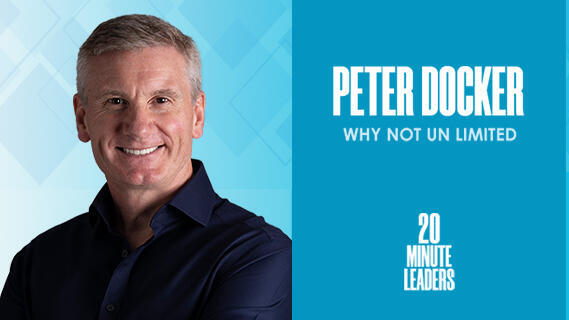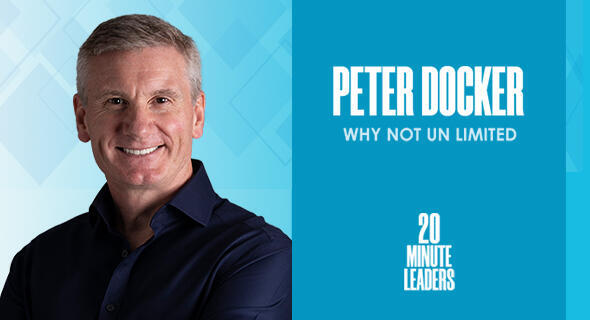
20-Minute Leaders
“Leaders who nurture that sense of belonging create an environment where people choose to step up.”
Making mistakes is important for growth as a leader, but only if you continue to be curious and to self-reflect, says Peter Docker, co-founder of Why Not Un Limited
Making mistakes is important for growth as a leader, but only if you continue to be curious and to self-reflect, says Peter Docker, co-founder of Why Not Un Limited and author of Leading From The Jumpseat. Curiosity is also essential for leaders to be better listeners, he shares. While we are often rewarded for knowing the answers, Docker explains that leaders need to be focused on asking the right questions and allowing their team to help figure out the answers. This is a part of what he calls humble confidence: pairing confidence in your strengths and destination with the humility to listen to others. Docker says discovering what is deeply important to you will give you the energy to move forward into the unknown. Another crucial element of leadership he shares is to create a sense of belonging for your team, which will inspire them to take on more responsibility.
Click Here For More 20MinuteLeaders
You’ve dedicated your career to harnessing human potential and helping others. Where does that come from?
For many years, it's just something that I did but not that intentionally. It's only later on in life that I've had the opportunity to reflect and identify those times when it didn't go quite so well, as well as the times it did fly well, and codify it. I've had the opportunity to visit 93 countries and work with leadership teams from companies in practically every sector. My curiosity has helped to inform what I see as great leadership and when it doesn't work so well either.
Where are you more curious: what makes great leadership or what makes it not work so well?
I don't think there is any such thing as a perfect leader. In my book, Leading From The Jumpseat, I mentioned a few times when I certainly did not get it right. Of course, it's by making those mistakes that we actually learn, provided we remain curious, remain reflective, and focus less on the individual data points but more on the overall trends.
Are we sourcing ourselves from a place of fear or a place of love? When we source ourselves from a place of love, we are looking at the world as a place of possibility and opportunity. We are looking at the chance to lift people up. That's what I mean by leading from love.
Curiosity and reflectivity: when in your life did you really understand that these two elements are crucial to becoming effective leaders?
I think one of the key aspects of great leaders is that they listen. You can only listen properly if you're curious about something. The great leaders I've worked with, they've been curious about my view and what I can contribute.
Our whole system, we are rewarded by knowing the answer. You become a specialist because you get good at a certain area. But when you're leading many people, if you've always got to be the one who knows the answer, you become the constriction in the pipe. Because your team can only advance as quickly as your own knowledge allows.
This is where curiosity and listening come in. Instead of being focused on knowing the answer, great leaders are focused on asking the important questions and feeling confident to lead when they don't know the answer. You are no longer that constriction in the pipe. Instead, you're leaning into your team and that collective genius who can step up and contribute to figuring out the answers.
Is this something that can be trained or taught, the art of being curious?
Yes, I think it is. It starts with self-reflection. I start the book by taking a deep dive into figuring out what is really important to us as individuals. For many of us, that's family. But when we start to dig deeper, there are other things that are very important to us.
For me, the reason I studied certain subjects in university is because my parents had both lost their jobs, and I wanted to be able to support them and also not to be a burden. That was one key thing that was revealed as something deeply important to me.
The reason that it's so valuable to identify those deeply important things is that it builds a reservoir of energy that helps you to step forward, even into the unknown. I'll give you an example. A couple of years ago, I had a call from my wife, and she'd been involved in a car accident. I dropped everything. I didn't know what I would find. I stepped into the unknown, but I was absolutely committed to moving forward. It's that energy that helped build that momentum to go and support my wife.
This is where it links into the curiosity piece. If we are deeply passionate about certain things, those hand rails that guide us, even in the unknown, then we are naturally likely to become curious. We want to learn as much as we can to solve the challenges in front of us. We can learn to lead with what I call "humble confidence."
Where do we see this humble confidence today?
There's a company called ASOS. It is in the fashion retail business. They are huge. They've got 400,000 products available online. Until pretty recently, the CEO was a chap called Nick Beighton, and Nick displays humble confidence.
So what is humble confidence? It's about being confident in your own strengths, absolutely resolute about where you're going with your team, whilst also being ready to make the decisions. But then the humble side comes in. It's having the humility to listen to others and recognize that we don't have all the answers. But seeing that as a strength rather than a weakness.
This is how Nick Beighton grew it from a very small company to a multi-billion-dollar consortium. He did this by lifting up his own people, by empowering them. This is a key tenet of what I call "jumpseat leadership." It is not about retaining or growing our own power. It's about lifting others up and empowering them so when the time is right, they can take the lead.
What is the most challenging piece of not retaining all the power yourself but harnessing it for others?
I think the biggest challenge is ego. Ego is generated when fear is triggered. Fear is triggered when our life is in danger. But fear is also triggered when our livelihood, our status, or our reputation feels under threat. When it's triggered because of one of those, often the reaction can be ego. We close down. We start seeing the world not as a place of opportunity but as a place of scarcity. It's where we stop thinking about other people. Acting from fear is not sustainable.
But we always have the choice to choose love, to choose humble confidence. Humble confidence is the antidote to ego. Because it comes from a place of love, it is sustainable. It will keep us going even when times are difficult.
Can we expect leadership to continue evolving? Or are we converging on this idea and we will continue with the same principles moving forward?
I think the finesse of it might change. The environment can change. But in my view, the main tenets of leadership hold steady throughout time. Leadership is underpinned by a clear commitment to accomplish something. A commitment is only a promise that we make to ourselves to follow through. Then having the humble confidence to listen to others.
But the last aspect of leadership, which I think is enduring, is to nurture a sense of belonging. We want to belong. Leaders who nurture that sense of belonging create an environment where people choose to step up and take responsibility. They choose to do more for the cause because they feel they belong. That's when leadership really starts to fly. Because we find that we actually need to lead less.
I think parenting is one of the greatest leadership challenges any of us can face. When you first become a parent, there's a whole bunch of stuff that you don't know, but you are absolutely committed to bringing up your children, honoring those things that you feel are deeply important. You are willing to step into the unknown, even when you don't know the answers. You have the humble confidence to ask others. It's an enduring commitment, which stays with you until the day that you die. Great leadership starts at home, and the fundamental aspects of leadership have not changed over the centuries.
Michael Matias, Forbes 30 Under 30, is the author of Age is Only an Int: Lessons I Learned as a Young Entrepreneur. He studies Artificial Intelligence at Stanford University, is a Venture Partner at J-Ventures and was an engineer at Hippo Insurance. Matias previously served as an officer in the 8200 unit. 20MinuteLeaders is a tech entrepreneurship interview series featuring one-on-one interviews with fascinating founders, innovators and thought leaders sharing their journeys and experiences.
Contributing editors: Michael Matias, Megan Ryan

